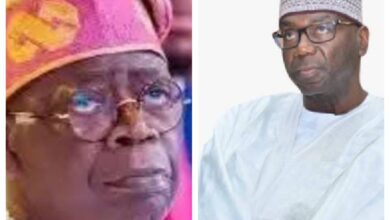2018 Hajj and challenges before NAHCON

With Tunde Akanbi
Each time I have the opportunity of visiting Saudi Arabia, my heart bleeds. This is because I see a country of a well organised people who are highly disciplined and focused. The leaders and the led are permanently on duty. Each and every citizenry, including the visitors to the Holy city, handle their responsibilities without being forced to do so. Everybody goes about their spiritual duties without molestation. Is it because Saudi Arabia is the custodian of the two Holy Mosques in the world or what?
Year in year out, over three million pilgrims from different parts of the world, including African leaders, with specific mention of leaders from the most populous black African country, Nigeria, converge with others to perform the pilgrimage.
No doubt, African leaders see the way government is being administered in the Holy land and the citizens see the way and manner discipline has become the watch-word of the people. Sharia law is really working in the Holy land as the law is not flexible. It’s a constitution that you can’t bend no matter how highly placed. One cannot compromise the security operatives in the Holy land. Their YES is YES while their NO is NO. In Saudi Arabia, there is no compromise or bargain for criminality. The multi-million Naira question that begs daily for answer is, does it mean that Nigerian leaders or African leaders at large, change their attitude like chameleons whenever they return home after performing the pilgrimage? This is an issue that gives one sleepless nights.
The Hajj, which is the Arabic word for pilgrimage, is an annual Islamic exercise to Saudi Arabia precisely to Mecca and Medina, the most holy cities for Muslims and mandatory religious duty for believers in Islam that must be carried out at least once in a lifetime by all adult Muslims, who are physically and financially capable of undertaking the journey and can support their family during their absence. It’s one of the five pillars of Islam.
Hajj is the largest annual gathering of people in the world and a demonstration of the solidarity of the Muslims to the House of Allah and their total submission to God.
The pilgrims are of different colours, from blue-eyed blondes to black-skinned Africans.
This clearly demonstrates that Islam is the religion that erases race problem.
One thing that is unique about the Holy land is that at Ka’aba, the Islam’s most sacred mosque, each person walks counter clockwise seven times around the Kaaba, during the state of Ihram , a special state of purity, men put on garments often consist of two white un-hemmed sheets (usually toweling material ) and are universal in appearance. While in this white garment, all pilgrims are equal before God. There is no difference between the rich and the poor, the white and the black.
Hajj is associated with religious and social significance, but not a tourist attraction or a tourist site. It is a spiritual merit that provides Muslims with opportunities of self renewal.
Hajj also stands as a reminder of the Day of Judgement when Muslims believe people will stand before God.
Hosting of hajj every year is an honor and a great responsibility for the Kingdom of Saudi Arabia, one which the authorities hold in high esteem and very dear to their hearts.
The Saudi Authorities spare no efforts towards ensuring the well-being of pilgrims as their number one priority is to welcome individuals from all over the world as they seek to fulfill their religious and spiritual obligations.
The 2017 pilgrimage has come and gone, but no doubt, there are still some issues that needed to be addressed to create room for more improvement in subsequent operations within and outside the country.
Kudos should be given to the Saudi Authorities for making necessary arrangements, each year for the growing number of pilgrims. Though, the hajj poses lot of logistic challenges for the government of Saudi Arabia which has since the 1950’s spent more than $100 billion to increase pilgrimage facilities.
Major issues like housing, transportation, sanitation, and health care have been addressed through the introduction of various development Programmes for the pilgrims to enjoy modern facilities and perform various rites with ease.
For instance, it’s no longer compulsory to kiss the black stone, instead, pilgrims simply point at it on each circuit around the Ka’aba.
One would recall that during the 2015 hajj, there was stampede where hundreds of deaths and injuries were recorded and described as the most deadliest so far in Saudi Arabia under that circumstance.
In 1990, another calamity that claimed several lives happened in a tunnel stampede. Due to this tragic development, the Saudi Authorities adopted various crowd – control techniques to ensure safety and guide against a repeat of such incidents. As a result of the large crowd that performed hajj yearly, some of the rituals have become more symbolic.
The Saudi Government often sets quota for various countries to keep the pilgrims number at a manageable level, and arranges huge security forces and CCTV cameras to maintain overall safety during hajj exercise.
Various crowd control techniques were also adopted to ensure safety and guide against a repeat of past accidents.
Saudi Arabia is a country where the citizens and the government are up and doing. Despite the fact that a very large assemblage of Moslems converge at a particular time to worship, it’s enough to give kudos to the Saudi Arabian Government. There is improvement in all their facilities from time to time.
The turnover of the Holy city’s economy increases yearly from pilgrimage apart from the fact that Saudi Arabia is an oil producing country. Nigeria as a nation, contributes a large number to the economy of Saudi Arabia, particularly during hajj operations as much as other countries of the world. Nigeria can also do well as the Saudi Kingdom if the leaders and the led have the fear of God and maintain discipline in their daily lives.
One area the Saudi Authority needs to pay greater attention is to open more airports in Jeddah, the country’s commercial capital to serve as alternatives to the King Abdulaziz International Airport, the busiest airport of Saudi Arabia, and the third largest airport in the kingdom. During hajj operations, particularly at the peak of the arrival and the outbound flights, airlines from across the world struggle to land. But with additional airports, flights would take place with less stress just as the Saudi Authority is already considering the introduction of train as part of its transport system to transport pilgrims. In his remarks when he hosted leaders from across the world, including the Nigerian Senate President, Dr. Bukola Saraki, during the 2017 hajj, the King of Saudi Arabia, Salman bin Abdulaziz Al Saud said the Holy land was more determined to provide best services during hajj to increase the facility of hajj performance and the safety of the visitors of the Grand Holy Mosque and the Prophets Holy Mosque.
Probably, if the regime of Muhammadu Buhari and Abdulbaki Babatunde Idiagbon was not short lived in 1984, the War Against Indiscipline which was initiated by their regime, Nigeria and her citizens would have by now been a highly disciplined nation. No matter the position or wealth, cut corners in the Holy land as one must queue to make purchases. As a driver, over-speeding is a grievous offense and attracts stiffer penalty. Forget about attempting to offer bribe. Definitely, it has no place in their system.
The security network in God’s own land is at its best. All the security apparatus are perfectly functioning, unlike in Nigeria where such equipment were mere decorations and in places where they are functioning, the bad boys, I mean the criminals are on ground to vandalise these equipment place through tax payers hard earned sweat.
Similarly, to add value to pilgrimage to the Holy land, the Saudi Authority has concluded plans to reduce its dependence on oil and therefore diversify to yearly pilgrimage to broaden services from oil to hajj operations.
One organization that is responsible for the conduct of the pilgrimage in Nigeria is the National Hajj Commission of Nigeria (NAHCON) in conjunction with the various States Muslim Pilgrims Welfare Boards and the airlines that are responsible for the airlift of pilgrims. No doubt, the NAHCON under the leadership of Barrister Abdullahi Muktar Mohammed, and his other abled lieutenants have always been doing their best to improve on this yearly pilgrimage for Nigerians but still, more need to be done in terms of feeding, medication, enlightenment and accommodation. The success of the officials is not unconnected to a culmination of intense hard work, dedication and commitment by the Hajj officials. There is however, the need for the commission and other stakeholders on hajj matters to leverage on the success recorded during the 2017 hajj, and consolidate on subsequent exercises. It’s also on record that the death recorded in the 2017 hajj which equally claimed the life of the legal adviser of the Commission, Barrister Ahmed Ndababo, has been described as the lowest casualty in the past fifteen years from Nigeria during pilgrimage.
Since most of the services to pilgrims were in dollar denomination, there is the need for the government to look into the exchange rate in future hajj exercises to reduce the high cost of spiritual journey to the Holy land. On the issue of accommodation, efforts should be made to consider centralising pilgrims accommodation just like what was obtainable in Madinah where Nigerian pilgrims would be accommodated in Markaziyah area closer to the Prophets Mosque.
NAHCON and various State Pilgrims Welfare Boards need to map out strategies and modalities for a unified accommodation system in Makkah and Medina so that pilgrims would have value for their hard earned money.
As suggested by one of the officials of NAHCON, Alhaji Adebayo Yusuf Ibrahim, the commissioner in charge of policy, personnel management and finance, the issue of feeding would be looked into by the Commission in subsequent hajj operations, whereby African food would be provided by Nigerian caterers for the pilgrims for them to feel more at home with local diets.
The 2017 Amirul Hajj for Kwara State, Professor Sulyman Jamiu who commended NAHCON and the Kwara State Muslim pilgrims Welfare Board for organising a smooth hajj exercise , also suggested that there should be age barrier on those performing the pilgrimage to Saudi Arabia. He gave the age barrier to between 70 and 75 years to reduce the stress elderly pilgrims that are not too healthy and without a partner or companion go through during the rigorous rites of the pilgrimage.
The involvement of the media by the commission in the coverage of the pilgrimage is commendable and states should also emulate such move to provide adequate coverage for state pilgrims.
On the part of the airlines engaged in the airlifting operations and the tour operators, sanction must be placed on any of them that violates the contractual agreements and those that performed well, should be compensated with more patronage in subsequent operations.
For this year, airlines such as Medview Airline, Max Air, Azman Airline and Flynas were engaged in the operations with most of the airlines maintaining credible records but there is the need for improvement in subsequent hajj operations, particularly in terms of proper coordination, hitch free and luxurious flights from Nigeria to Athens, Kingdom of Saudi Arabia and back home on schedule.
Now that arrangements for the 2018 hajj operations have begun, all obstacles, experienced during the 2017 operations must be removed and Nigerian pilgrims should continue to be good ambassadors of Nigeria.





